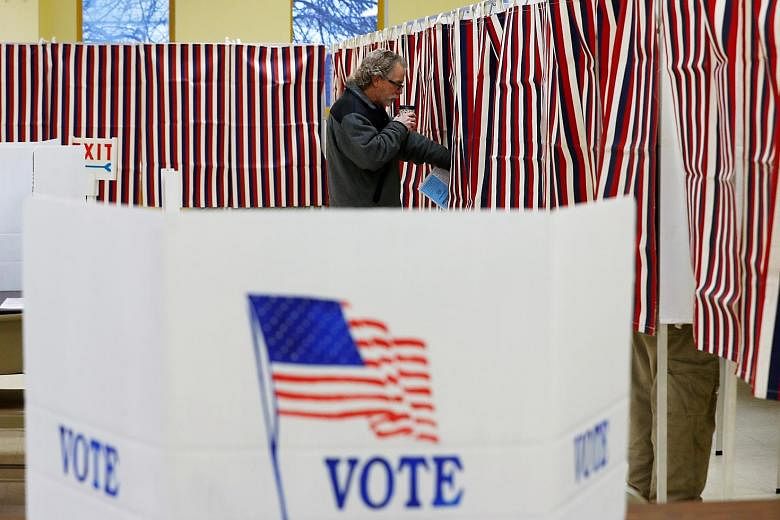SAN FRANCISCO • The day after the New Hampshire primary last month, Facebook removed a network of fake accounts that originated in Iran, which had posted divisive partisan messages about the United States election inside private Facebook groups.
Hours later, the social network learnt that the campaign of Mr Michael Bloomberg, the billionaire former New York mayor, had sidestepped its political advertisements process by directly paying Instagram meme accounts to post in support of his presidential bid.
That same day, a pro-Trump group, which had previously run misleading Facebook ads, was found to be promoting a photo that falsely claimed to show Mr Bernie Sanders' supporters holding signs with divisive slogans such as "Illegal Aliens Deserve the Same as Our Veterans".
Facebook, Twitter, Google and other big tech companies have spent the past three years working to avoid a repeat of the 2016 election, when their platforms were overrun by Russian trolls and used to amplify America's partisan divide.
But as the events of just one day - Feb 12 - at Facebook showed, although the companies are better equipped to deal with the types of interference they faced in 2016, they are struggling to handle the new challenges of 2020.
Russia and other foreign governments once conducted online influence operations in plain sight, buying Facebook ads in roubles and tweeting in broken English. But they are now using more sophisticated tactics such as bots that are nearly impossible to distinguish from hyperpartisan Americans.
More problematic, partisan groups in the US have borrowed Russia's 2016 playbook to create their own propaganda and disinformation campaigns. Even well-funded presidential campaigns have pushed the limits of what the platforms will allow.
Ms Laura Rosenberger, director of the Alliance for Securing Democracy, said: "Any time you're dealing with a sophisticated actor, they're going to evolve their tactics as you evolve your defences."
By most accounts, the big tech companies have become better at stopping certain types of election meddling, such as foreign trolling operations and posts containing inaccurate voting information. But they are reluctant to referee other kinds of social media electioneering for fear of appearing to tip the scales.
Some Facebook and Google employees said they feared being blamed by Democrats for President Donald Trump's re-election, while others said they did not want to be seen as acting in Democrats' favour. Privately, some said the best-case scenario in November would be a landslide victory by either party, with a margin too large to be pinned on any one tech platform.
The most divisive content this year may not come from Russian trolls, but from US politicians using many of the same tactics to push their own agendas.
One chief perpetrator? The White House.
Last month, Mr Trump and other Republicans shared a video of House Speaker Nancy Pelosi tearing up a copy of Mr Trump's speech at the end of his State of the Union address. But the video was edited so it appeared as if she had torn up the speech while he honoured a Tuskegee airman and military families.
Ms Pelosi's spokesman called for the video to be removed from Facebook and Twitter, but the companies said it did not violate their policies on manipulated media.
This month, White House social media director Dan Scavino shared an edited video showing former vice-president Joe Biden appearing to say: "We can only re-elect Donald Trump."
In fact, the full video showed him saying Mr Trump would get re-elected only if Democrats resorted to negative campaigning. Facebook did not remove the video.
"We can't blame Russia for all our troubles," said Mr Alex Stamos, Facebook's former chief security officer. "The future of disinformation is going to be domestic."
NYTIMES

